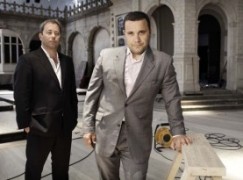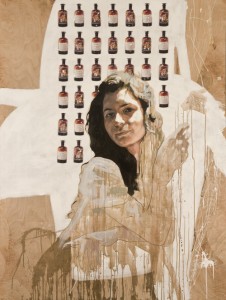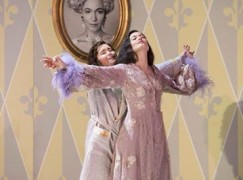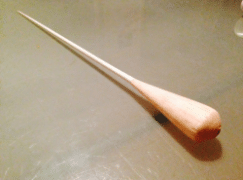


Rupert Christiansen (pictured) has defended his right to insult singer’s body-shape in the safety of his own paper, but he’s too scared to do it on radio, live or pre-recorded.
The BBC’s World at One asked me to argue a case against critical offences. None of the offending critics was man enough to oppose it.
Shame. Nothing was ever gained by timidity.

Back to work, then.
It’s the attorney general of the state of California and the question is whether public funds were properly handled during the period when the opera company was stumbling to near-closure. More here.

When Grace Bumbry stepped onto the stage at Bayreuth as Venus in 1961, opera magazines and conservative media were poleaxed by perplexity. Here was a beautiful young American singer, 24 years old, appearing in Tannhäuser, opposite Victoria de los Angeles and Wolfgang Windgassen, luxury casting even by Bayreuth’s standards.
Just one problem: Grace was black. Wagner was race-pure. The media wanted to know what the hell was she doing in these hallowed halls.
The audience provided the answer. It gave Grace a half-hour standing ovation and 42 curtain calls. Game over.

When Matthew Bourne put on an all-male Swan Lake in 1995, reactionary media gave him the same reception. Tchaikovsky wrote for ballerinas, didn’t he?
Bourne’s Swan Lake went on to become the longest-running ballet on Broadway.
Opera and ballet are all about illusion. That is why the Telegraph critic is utterly wrong when he argues: Fat and thin can be equally beautiful, but one has to make an audience believe. There are times when physical absolutes make this impossible.
Wrong, wrong and wrong again. We go to the theatre to have our preconceptions challenged. We want to see something different, to have expectations overturned. We want to hear great singers, regardless of colour, race, shape or whatever. We want the experience to override physical absolutes, as it did with Grace Bumbry, as it did with Matthew Bourne. That’s the way great art goes forward.
Rupert’s way leads only to the grave.
Michael Volpe, founder and manager of Opera Holland Park in London, shares the public and professional outrage at the critical body-weight assault on a beautiful young singer at Glyndebourne. But, in an article for Slippedisc.com, Michael (pictured right) argues that the opera industry needs to look closely at its practices. It has been guilty, he says, of ‘sexing up’ productions in pursuit of an elusive mass audience.
‘We have sought out audiences who come from a world where looks ARE everything and to some degree we have pandered to them.’
You can read his full article below. Discuss.

I ought to tread carefully amid the body shaming sturm und drang of Glyndebourne’s Rosenkavalier . Everybody has a hair trigger, the web is alight with not just this issue but associated matters of misogyny. But I do think we need to step back one pace and examine our own industry, our practices and our attitudes. First, so that I can try to discuss the matter unfettered, a qualification; I do not believe it was, or is, appropriate to mention the singer’s body shape. I have never thought it appropriate. There. Hope that suffices.
But let us look at how things ARE, as opposed to how they should be. Over the past twenty five years, I have been deeply involved in selling the concept of opera to the masses and the overwhelming emphasis has been the elevation in the public’s mind of opera to a theatrical and “relevant” art form. The entire industry, moreover, has been at it and I have lost count of the number of articles and interviews I have read (or written) on how opera is way beyond the stereotype image of the “fat lady with a horned helmet”. As an industry, we have been trying to sex it up for ages, acquiescing to the media demand that we prove opera isn’t anachronistic. Singers – male and female – get their kit off on stage, in photo shoots they gaze sexily at the viewer, we salivate at the mesmerising concept of an immensely talented singer who also happens to be hot, trumpeting that “opera isn’t what you think!” We advertise operas with husband and wife leads as “opera’s hottest couple”, present productions with nudity (like this Rosenkavalier in fact), we try to be bold, challenging and above all produce shows that amplify the sexual angst and bodice-ripping of opera and the literature upon which it is often based. In opera, we are indeed obsessed with sex and sexuality and have been objectifying singers for years. OHP’s productions are far from straight-laced, but these are the facts and it is indisputable that opera has chosen to cavort with the devil; people judge us by the standards of other art forms.

Of course, the problem that opera has is that it is an extraordinarily specialist craft, requiring unrivalled training and ability. We demand, or we at least should demand, the finest voices. But we also tell audiences, many of them raised on popular culture, that the operatic stage offers unrivalled dramatic purpose, it is believable, it is a coruscating, emotional roller-coaster. Yet so many of those new audiences that we have tried to appeal to don’t yet realise and understand what opera demands of its exponents and we have been busy trying to tell them they can relate to it in the same way they can relate to their favourite soap. We have sought out audiences who come from a world where looks ARE everything and to some degree we have pandered to them.
And what of the critics and our own industry? Are any of us unfamiliar with stories of directors who cast physically, have we not forced critics to accept the wider view that opera needs to change and be given more room to evolve and flourish in the new (digital) world order? Are we blameless?
You see, I think we are right to be angry about the reviews in question (several critics will confirm past opprobrium from me on this matter) because they are rude and unpleasant for the singer.
What I have had trouble with are the consequent arguments positing the theory of what opera is (i.e “all about the singing, we don’t do sexy”) when it has become something else entirely. The opera industry is now fulminating over the incident and whilst all of the comment I have read seems immensely heartfelt (and the solidarity with the singer is terrific) I do find the claims that opera has nothing whatever to do with theatricality and is instead entirely about the singing a little hard to swallow. Yes, companies should cast blind, because audiences will rarely accept an attractive but poor singer; on this we can all agree. And singers do not have to be svelte or handsome to effect believability, something that is at the heart of the matter, but we must also take umbrage when reviewers make a meal of the attractiveness of singers, we must stop chasing column inches and retweets with controversies and provocative headlines and above all, we should stop trying to dance unendingly with the digital devil and those whose entire world it is and for whom live performance experiences, let alone by good-looking performers, hardly ever features. Media will demand more of the kind of thing we saw yesterday because we have had a hand in teaching them how to behave.
Opera should be what opera is, what we know it can be; if we keep shifting the emphasis, if we maintain our insistence that we are relevant by aping the worst excesses of theatre, West End, youth culture and the “it” crowd, then it won’t be people like Rupert Christiansen we have to worry about, it will be the entire audience in the theatre. If there is one, of course.
(c) Michael Volpe/slippedisc.com
Rupert Christiansen has come out fighting in the Daily Telegraph. He wants you to understand why he was right to call a young singer ‘dumpy’ and to damn her physique as ‘intractable’, which could be taken to mean that she is unemployable on the opera stage.
Rupert believes that body insults are a legitimate part of the critical repertoire. Many will consider that indefensible.
You may read read his argument in full here. Many will find them indefensible. But credit Rupert with the courage to come out into the open and engage with the issues.

Our condolences to the Metropolitan Opera general manager on the death of his father.
Arthur Gelb, who was 90, had been an influential figure at the New York Times, where he rose from copy boy to managing editor. It was there that he met married a niece of the violinist Jascha Heifetz and became highly visible in musical circles.
Alternately charming and assertive, Arthus Gelb was vociferously accused of promoting his musical friends in the paper’s cultural pages. The assertion is repeated in an affectionate though unusually well-balanced obituary in today’s paper.
Unions at the Met, which are in dispute with Peter Gelb, have published a sympathy statement (below):

Metropolitan Opera Orchestra Musicians and Local 802, AFM Honor the Life of Arthur Gelb, Father of General Manager Peter Gelb
May 20, 2014, New York, N.Y.—The Metropolitan Opera Orchestra Musicians and Local 802, AFM wish to convey our sincere condolences to Peter Gelb and his family on the occasion of the death of his father Arthur Gelb, who changed New York City and the nation for the better, not only as a legendary newspaper editor but as a great champion of the arts. We respectfully honor his legacy, and wish his family comfort in this time of loss.
Warner Classics are cock-a-hoop, announcing that a Maria Callas biopic is heading into production, to be directed later this year by the New Zealander, Niki Caro. An awful lot can go wrong between now and then.
Casting is, as they say, not yet complete.
Put in your bids now.
Slippedisc is punting for Penelope Cruz.
Any better offers?


Dutch Public Radio is auctioning off a baton used by Bernard Haitink when he was chief conductor of the Concertgebouw, an orchestra he says he will never conduct again.
Bids have just reached 390 Euros ($534) and there are two days to go.
Click here.

h/t: Dianne Winsor
The incoming Munich Philharmonic conductor has published an appeal to the city, in English and German, asking for tolerance and understanding between Russians and the West. The appeal is a stream-of-consciousness ramble, recognisably in Valery’s voice.
Key points:
– I cannot ignore the fact that parts of Russian society live according to fundamental principles that are different from those of Western societies.
– I respect the principles of life that are extremely important to the people of Russia. These include upholding taboos that have not applied in Western countries for many years.
– Circumstances of Realpolitik can suddenly infiltrate the common ground of our cultural work and cause harsh and jarring discord.
– It is particularly crucial at times like these to still have the courage to listen to the other side and to exchange opinions.
The full letter in both languages is published first here on Slippedisc.com.

Dear subscribers and friends of the Munich Philharmonic,
The events in and around the Ukraine have been dominating the headlines over the last
few weeks, causing new rifts between East and West that are distressing to all of us. I,
personally, have also become the subject of accusations and controversial disputes. I
would like to take this opportunity to make a personal statement.
I am immensely proud of the fact that I have been appointed by the city of Munich to
head the Munich Philharmonic as Music Director in the 2015/16 season. Yet this
appointment means much more to me. In my opinion it is based on trust and on the
belief that, together, we can and must succeed in upholding this city’s unique musical
culture and to guide it into the future. I am fully aware of the magnitude of this task and
the responsibility associated with it and my future orchestra. Therefore, I shall do my
very best to ensure that our concerts are filled with unforgettable moments.
I am a musician and conductor. However, I am also a Russian citizen with close
connections to my native country. For nearly a quarter century I have been in charge of
the Mariinsky Theatre in St. Petersburg, one of the world’s most prestigious theatres,
home to the the Mariinsky Opera, Ballet and Orchestra. My range of musical activities
is not limited to this one post. I have been conducting music in the most important cities
around the world for many years and work together with many orchestras and musical
colleagues. Music is both my profession and my passion and I have devoted myself to it,
heart and soul, from a very early age. I also assumed responsibilities to ensure that the
cultural and musical tradition of St. Petersburg continues to blossom.
Future political developements could give rise to problems along the lines of what we
are currently experience since some people might interpret my involvement given my
nationality. In some countries I am seen as a representative of a “different” society,
which does not stand for the values and principles of Western life, or does not advocate
for them strongly enough. But is this accurate? After all, our Russian musical culture
was Europeanised by Mikhail Glinka and is influenced and shaped, in particular, by the
German musical culture. Many people in my native Russia are very well aware of this.
Yet, on the other hand, I cannot ignore the fact that parts of Russian society live
according to fundamental principles that are different from those of Western societies.
For example, many elements of Russian culture are based on the Russian Orthodox
religion and the traditions associated with it which still plays a fundamental role in
people’s lifestyles. It is important to recognize that this tradition has helped the Russian
population to survive such difficult eras in the twentieth century.
I respect my people and their traditions. I also respect the principles of life that are
extremely important to the people of Russia. These include upholding taboos that have
not applied in Western countries for many years, but where many attempts and much
time was needed to abolish them. With respect to my personal stance, there is no one in
my ensemble and team who could accuse me of anything. One of my most important
principles is respect for others and their personal lives.
Of course, I am aware that my work, my initiative and my commitment – to the extent
that music has an influence on everyday life – demand a high degree of responsibility
towards my fellow citizens and at times these functions can be construed in a political
nature. Nevertheless, I aim a continuous believer in music’s power to reinforce societies
and their great traditions. That is why it is very important to me to help promote and
invigorate educational music programmes.
I know that many colleagues throughout the world support me in my efforts. Yet this
can and must not hide the fact that circumstances of Realpolitik can suddenly infiltrate
the common ground of our cultural work and cause harsh and jarring discord. In my
opinion, it is particularly crucial at times like these to still have the courage to listen to
the other side and to exchange opinions. Moreover, we should not lose respect for each
other and never allow for communication to breakdown. We should always be able to
exchange thoughts and ideas.
It might sound banal, which does not make it wrong, in fact, quite the opposite is true in
my experience: Music is the best bridge-builder!
I look forward to welcoming you to many concerts, perhaps as early as July as the
Munich Philharmonic and Marinsky Orchestra complete their Strawinsky Cycle
Yours sincerely,
Valery Gergiev
—
Sehr geehrte Abonnentinnen und Abonnenten,
liebe Freunde der Münchner Philharmoniker,
die Ereignisse in und rund um die Ukraine beherrschen in diesen Wochen die Schlagzeilen und
erneut werden Gräben zwischen Ost und West aufgerissen, die uns alle bestürzen. Auch meine
Person wurde dabei zum Gegenstand von Vorwürfen und kontroversen Auseinandersetzungen.
Deshalb möchte ich mich heute mit einer persönlichen Stellungnahme in Form dieses Briefes
an Sie wenden.
Dass ich von der Stadt München berufen worden bin, ab der Saison 2015/16 die Münchner
Philharmoniker als Chefdirigent zu leiten, erfüllt mich mit größtem Stolz. Doch bedeutet diese
Berufung für mich noch mehr. Sie beruht nämlich in meinen Augen auf Vertrauen und auf der
Zuversicht, dass es gemeinsam gelingen kann, dieser Stadt ihre einzigartige Musikkultur zu
erhalten und diese auch der Zukunft zu öffnen. Der Größe und Verantwortung, die in dieser
Aufgabe liegt, bin ich mir durchaus bewusst. Mein künftiges Orchester und ich werden alles
tun, Ihnen mit unseren Konzerten unvergessliche Erlebnisse zu schenken.
Ich bin Musiker und Dirigent. Ich bin aber auch Russe und meinem Heimatland eng verbunden.
Seit nahezu einem Vierteljahrhundert leite ich die Geschicke eines der angesehensten
Opernhäuser der Welt, die Mariinsky-Oper in St. Petersburg. Mein musikalisches Tätigkeitsfeld
ist darauf nicht begrenzt. Ich dirigiere seit Jahren in den bedeutendsten Musikmetropolen der
Welt und musiziere mit vielen Orchestern und Musikerkollegen zusammen. Mein Metier und
meine Leidenschaft ist die Musik, und ihr habe ich mich von früh an mit ganzer Seele
verschrieben. Ich habe dabei aber auch Verantwortung übernommen, um die kulturelle,
musikalische Tradition von St. Petersburg am Blühen zu erhalten.
Daraus können im Falle politischer Entwicklungen Probleme entstehen, wie wir sie jetzt haben,
und in die mich einige verwickelt sehen. Ich gelte in manchen Ländern als Vertreter einer
„anderen“ Gesellschaft, die nicht entschieden genug für die Werte und Lebensgrundsätze des
Westens stehe und dafür einträte. Doch ist das richtig? – Gerade unsere russische musikalische
Kultur ist seit Michail Glinka europäisch und da vor allem von der deutschen Musikkultur
beeinflusst und geprägt. Das ist vielen Menschen in meiner Heimat Russland sehr bewusst.
Doch ich kann andererseits auch nicht außer Acht lassen, dass die russische Gesellschaft
teilweise nach anderen fundamentalen Prinzipien lebt, als das in den westlichen Gesellschaften
der Fall ist. So spielt die kulturelle – tief in der orthodoxen Religion verwurzelte – Orientierung
für die russischen Menschen eine nach wie vor elementare Rolle in der Lebensführung, was im
übrigen auch geholfen hat, dass die Menschen in Russland schwierige Situationen im
20. Jahrhundert überleben konnten.
Ich achte mein Volk und seine Traditionen. Ich achte und respektiere auch das, was als
Lebensmaxime in Russland den Menschen von hohem Wert ist. Dazu gehört auch das
Festhalten an Tabus, die in den westlichen Ländern seit einigen Jahren nicht mehr gelten, aber
zu deren Aufhebung es viele Anläufe und viel Zeit brauchte. Was meine persönliche Haltung
angeht, so wird es niemanden geben in meinem Ensemble und Team, der mir etwas vorwerfen
könnte. Der Respekt dem anderen und seinen Belangen gegenüber ist für mich ein oberstes
Prinzip.
Ich weiß natürlich, dass meine Arbeit, meine Initiativen und mein Engagement, wo sie auf die
Prägung von Lebenswirklichkeit mit Musik hinauslaufen, ein hohes Maß an Verantwortung
gegenüber meinen Mitmenschen fordern und deshalb immer auch politisch sind. Aber ich
bleibe bei der Musik, weil ich an deren gesellschaftsbildende Kraft und an den hohen Wert
ihrer Tradition glaube. Deshalb liegt mir auch so viel an der Förderung und Vitalisierung von
musikalischen Erziehungs- und Bildungsprogrammen.
In diesen Bemühungen weiß ich mich mit vielen Kollegen in der ganzen Welt verbunden. Doch
das kann und soll nicht darüber hinwegtäuschen, dass realpolitische Probleme plötzlich in die
Gemeinsamkeit unserer kulturellen Arbeit harte und schrille Dissonanzen hineinschicken. Doch
gerade dann ist aus meiner Sicht entscheidend, dass wir den Mut behalten, der jeweils anderen
Seite zuzuhören und uns wechselseitig auszutauschen. Dass wir dabei nicht den Respekt
voreinander verlieren. Der Dialog darf nicht abreißen, niemals! Der Austausch der Gedanken
muss möglich bleiben.
Auch wenn es abgegriffen klingt, aber es ist deshalb nicht falsch, ganz im Gegenteil: Musik ist
der beste Brückenbauer!
Ich freue mich auf viele gemeinsame Konzerte mit Ihnen – vielleicht schon im Juli, wenn der
Strawinsky-Zyklus der Münchner Philharmoniker und des Mariinsky-Orchesters zu seinem
Abschluss gelangt.
Sehr herzlich,
Ihr
Valery Gergiev
Everyone knows how George Martin recuited an ad hoc string quartet – Tony Gilbert (violin), Sidney Sax (violin), Kenneth Essex (viola), Francisco Gabarro (cello) for an overdubbing session on the early Paul McCartney song, Yesterday. McCartney liked it so much he released a voice-free version with guitar and string quartet on the Help! album.
Yesterday has become an encore standby in the lives of many string quartets.

It has also made the Beatles irresistible to string arrangers, mostly as hack transcriptions. But a new set from the finest string quartet in the Czech Republic – and that’s saying something – caught my ear. It’s my Album of the Week on Sinfini.com. Click here.
Gerald Finley – the Don Giovanni de nos jours – is giving up a lot of fat festival fees to climb Kilimanjaro in August. It’s in aid of Help Musicians UK, formerly known as the Musicians Benevolent Fund. You can sponsor Gerald and his two sons here.
They are looking to raise £10,000 for HMUK. C’mon Slippedisc readers, we can beat that.

Gerald’s statement: I have been very fortunate to scale the heights of music mountains such as Hans Sachs in Die Meistersinger, Oppenheimer in Doctor Atomic and also Winterreise, as well as having wonderful new music written for me. It seemed an appropriate moment and a natural choice to take on Kilimanjaro, acknowledging the help of and thanking those colleagues who have aided my musical treks.
I know that Help Musicians UK have been key in supporting those who find themselves with challenges. We musicians don’t often qualify for straightforward assistance; Help Musicians UK can be there in the tough times. Please help them make a difference to those whose talents need support in difficult circumstances. Give me a tune/song/aria to sing while climbing, to keep the breathing and rhythm strong…!